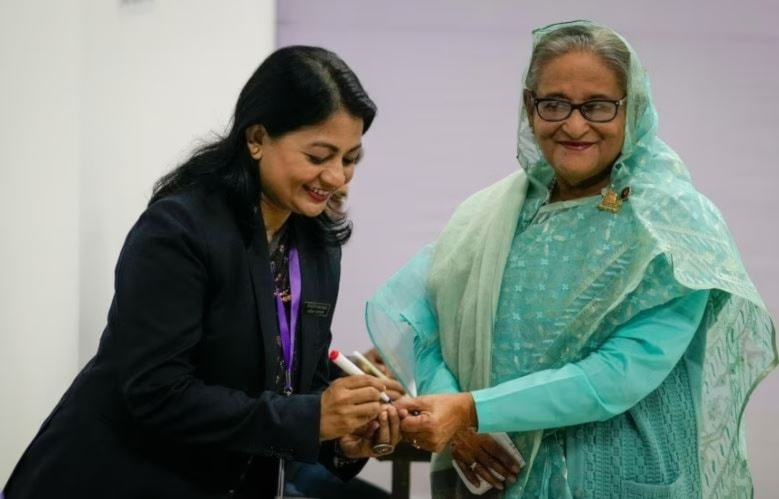Bangladesh election marred by violence and opposition boycott
Bangladeshi voters have participated in a parliamentary election that set the stage for Prime Minister Sheikh Hasina and her Awami League to secure a fourth consecutive term.
-

A Bangladeshi polling officer puts indelible ink on the finger of Bangladesh Prime Minister Sheikh Hasina after arriving to cast her vote in Dhaka, Bangladesh, Sunday, January 7, 2024. (AP)
Low voter turnout was observed in Bangladesh during the general elections, as the main opposition political parties boycotted the polls.
As of Sunday noon, only 18.5% of registered voters had participated. Despite the initial figures, the Election Commission Secretary, Md. Jahangir Alam, expressed optimism that the voter turnout would likely rise before the polls closed.
He reported that, on average, 18.5% of voters had cast their ballots nationwide by midday, halfway through the voting period.
Voting commenced at 8 a.m. local time and was scheduled to conclude at 4 p.m. local time. Approximately 120 million registered voters are eligible to participate in the election to choose 300 lawmakers for the parliament, locally referred to as the Sansad.
Violence Shadows Bangladesh Election
Reports of violence have surfaced in 37 regions across the country, leading to the arrest of five individuals, according to the election authority. A supporter of the ruling party was fatally attacked in the central Munshiganj-3 Constituency on Sunday, as reported by local Channel 24 television.
Meanwhile, Bangladesh Prime Minister Sheikh Hasina cast her vote in the morning in Dhaka, expressing to the media that the election is proceeding peacefully and fairly. She confidently stated that her party is poised to return to power for the fourth consecutive time.
Contrastingly, Abdul Moin Khan, a Standing Committee member of the opposition Bangladesh Nationalist Party (BNP), denounced the election as a charade to the nation. He asserted that the low turnout is indicative of the flawed process.
"The BNP is a terrorist organisation," Sheikh Hasina told reporters after casting her vote.
The ruling Awami League party and its ally Jatiya Party have fielded candidates for the elections, while the primary opposition BNP and Jamaat-e-Islami party opted for a boycott, refraining from filing any nominations. In response to the opposition's call for a boycott, a shutdown is being observed, with claims that the polls lack fairness.
On Saturday, Chief Election Commissioner Kazi Habibul Awal expressed regret that the desired political participation and competition were absent in this election. Awal mentioned the deployment of a total of 800,000 law enforcement members, including armed forces, across 42,000 polling centers to ensure a peaceful election.
Read more: Macron tries to 'consolidate' with Bangladesh, fend off 'imperialism'

 3 Min Read
3 Min Read








